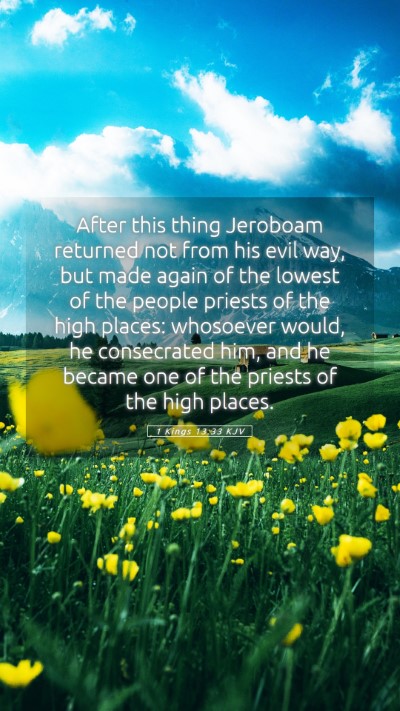Understanding 1 Kings 13:33
Bible Verse: 1 Kings 13:33 - "After this thing Jeroboam returned not from his evil way, but made again of the lowest of the people priests of the high places: whosoever would, he consecrated him, and he became one of the priests of the high places."
Verse Interpretation
This verse highlights the stubbornness of Jeroboam in continuing his idolatrous practices despite divine warnings. The decisions he made led to the further corruption of worship in Israel.
Bible Verse Meaning
The verse encapsulates several key themes regarding leadership, the influence of sin, and the nature of worship:
- Persistence in Sin: Jeroboam's refusal to turn from his evil ways implies a deep-seated commitment to wrongdoing.
- Corruption of Worship: The appointment of unsuitable priests symbolizes the degradation of true worship.
- Rejection of God's Authority: The verse shows how Jeroboam operated independently of God's commands, leading to chaos in spiritual leadership.
Commentary Insights
Matthew Henry's Commentary: According to Matthew Henry, this passage reflects on Jeroboam's unrepentant heart. He continued to lead Israel into idolatry, showing that the consequences of setting oneself against God can ripple through a nation's spiritual life.
Albert Barnes' Interpretation: Barnes suggests that the choice of "the lowest of the people" indicates Jeroboam’s disregard for biblical qualifications for the priesthood. This decision aimed to consolidate power and maintain control over Israel's worship practices.
Adam Clarke's Explanation: Clarke emphasizes the inclusivity of Jeroboam’s priesthood, where anyone could become a priest. This reflects the principle that he prioritized political allegiance over spiritual integrity.
Historical Context
To understand the implications behind this verse, one must consider the historical context of Israel during Jeroboam's reign:
- Division of the Kingdom: The split between Judah and Israel created a power vacuum and a desperate need for legitimacy in leadership.
- Idolatrous Practices: Jeroboam's introduction of golden calves indicated a deliberate departure from worshiping Yahweh, reflecting the cultural pressures of the time to appease the populace.
Significance of 1 Kings 13:33
This verse serves as a warning about the dangers of leadership devoid of moral accountability. Jeroboam's actions led to the establishment of a false religious system, which compounded the spiritual decline of Israel.
Application to Daily Life
The lessons drawn from Jeroboam's reign can be reflective for modern believers in several ways:
- Integrity in Leadership: Whether in the church or community, leaders should maintain a standard of holiness and accountability.
- Vigilance Against Idolatry: Believers must guard against practices that may compromise their relationship with God, even if they seem culturally acceptable.
- Responsibility to God’s Word: Careful study and adherence to scripture should guide worship and practice over personal convenience or popularity.
Cross References
1 Kings 13:33 relates to various other scriptures that speak on similar themes of worship and leadership:
- Exodus 32:1-10 - The golden calf incident.
- 1 Kings 12:28-30 - Jeroboam’s establishment of idol worship.
- 2 Chronicles 11:14 - The priests abandoning Jeroboam.
Conclusion
In summary, 1 Kings 13:33 is a stark reminder of the consequences of disobedience and the importance of maintaining true worship. Through the commentaries of biblical scholars, we gain a deeper understanding of Jeroboam's actions and their implications for both ancient Israel and modern believers.


